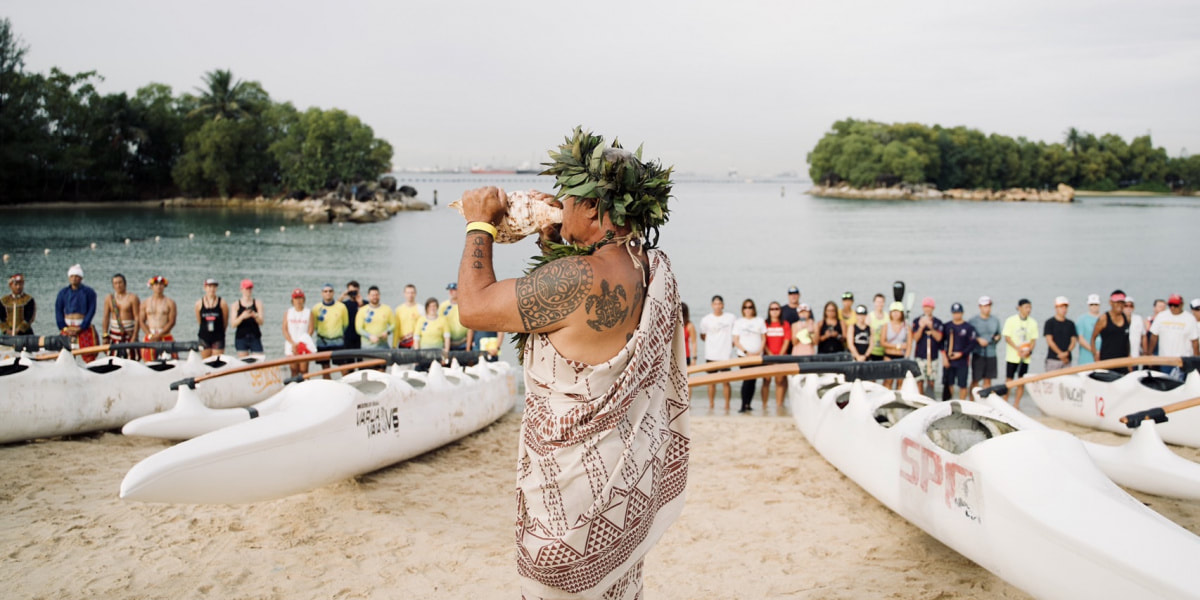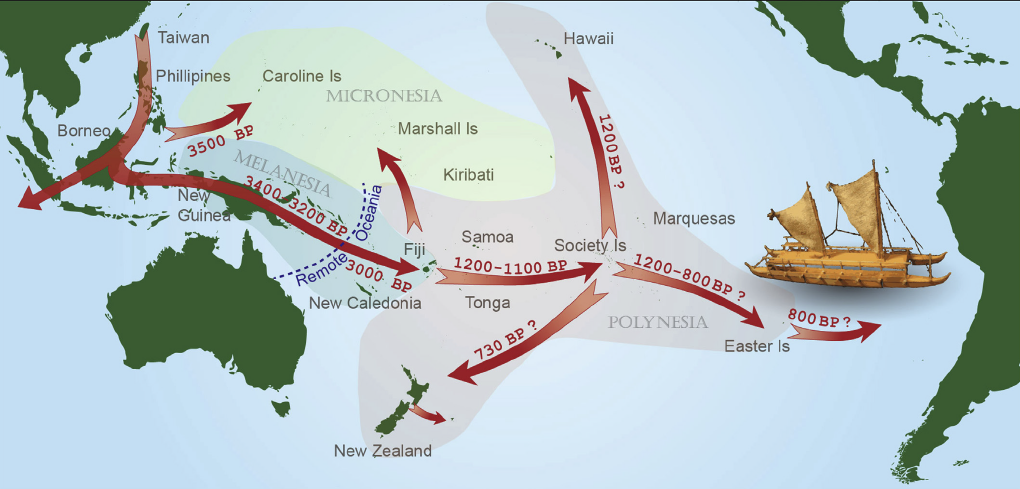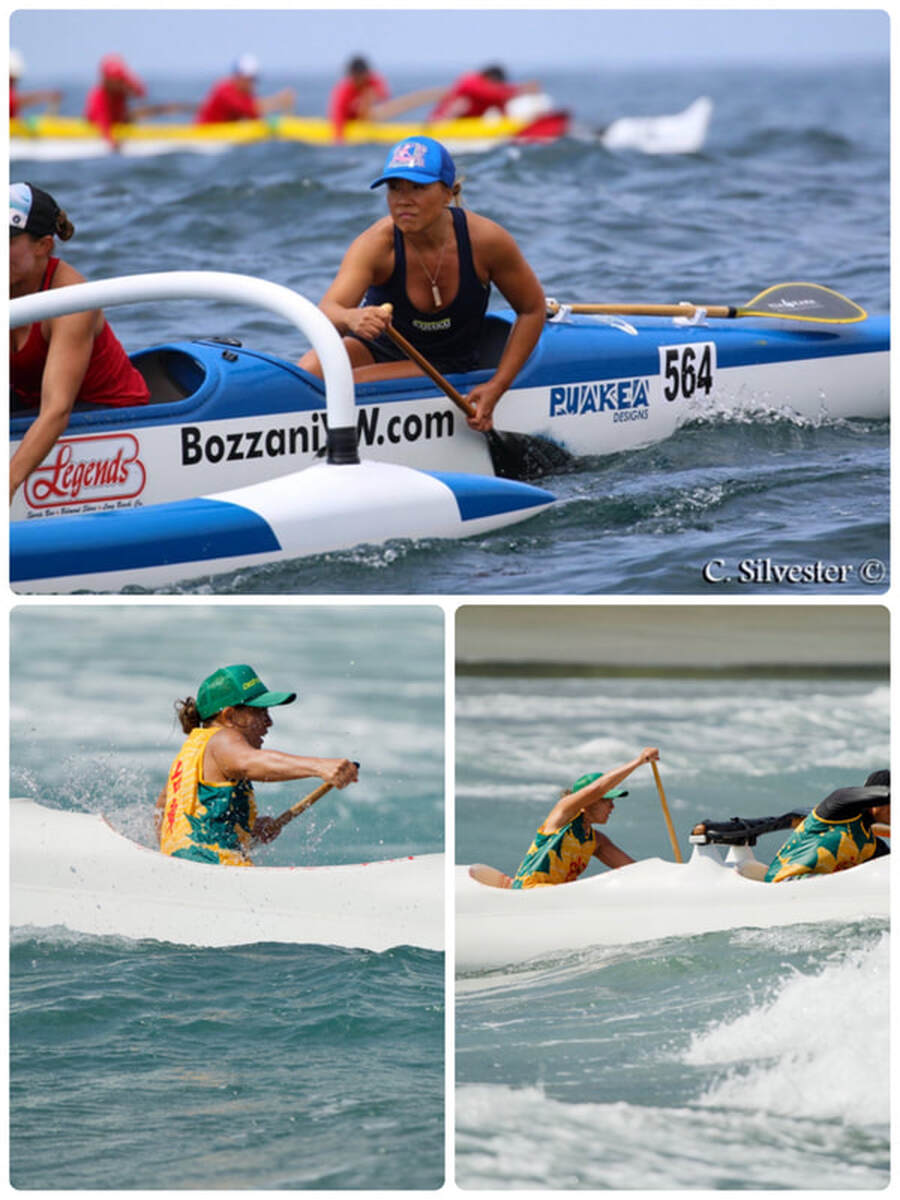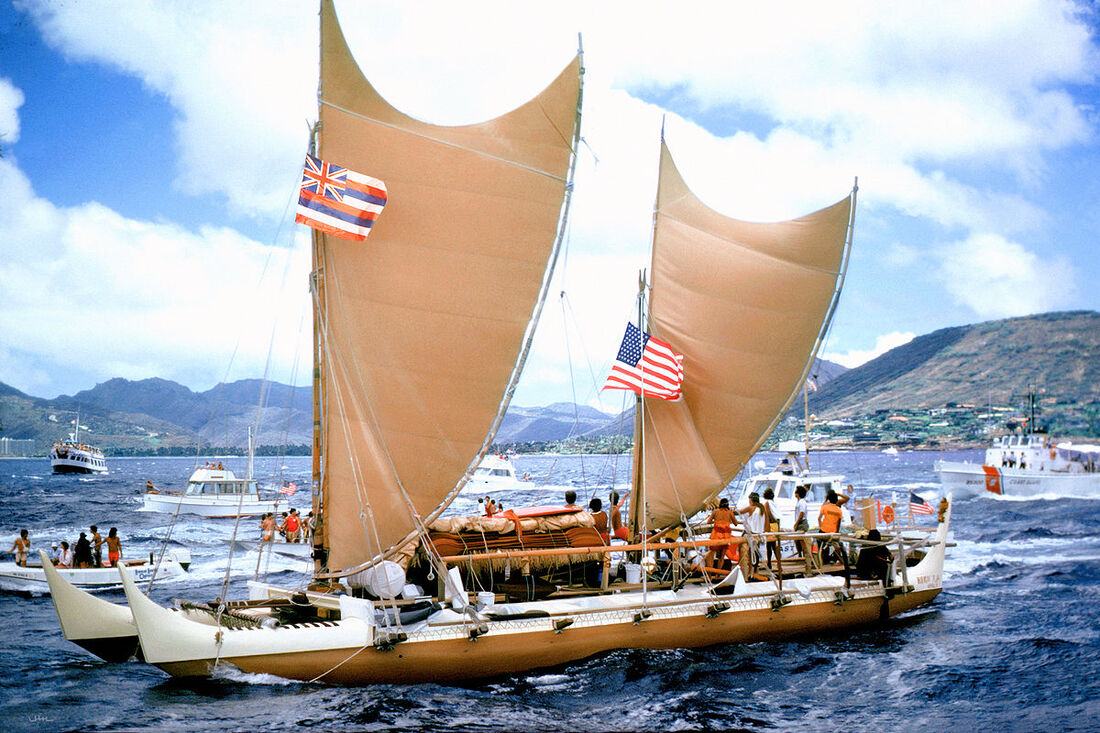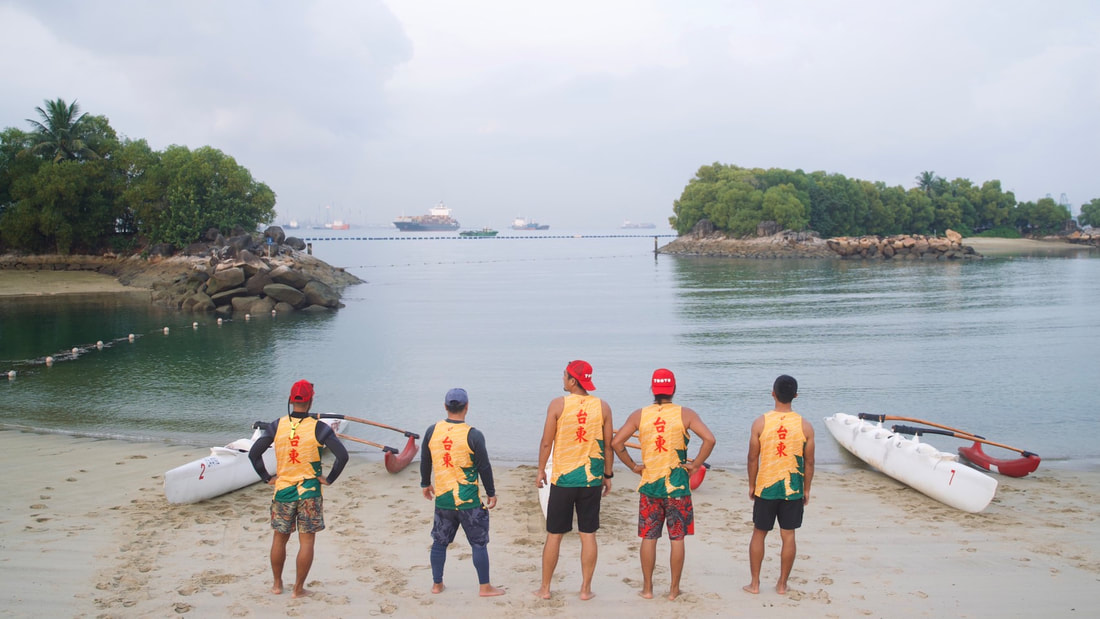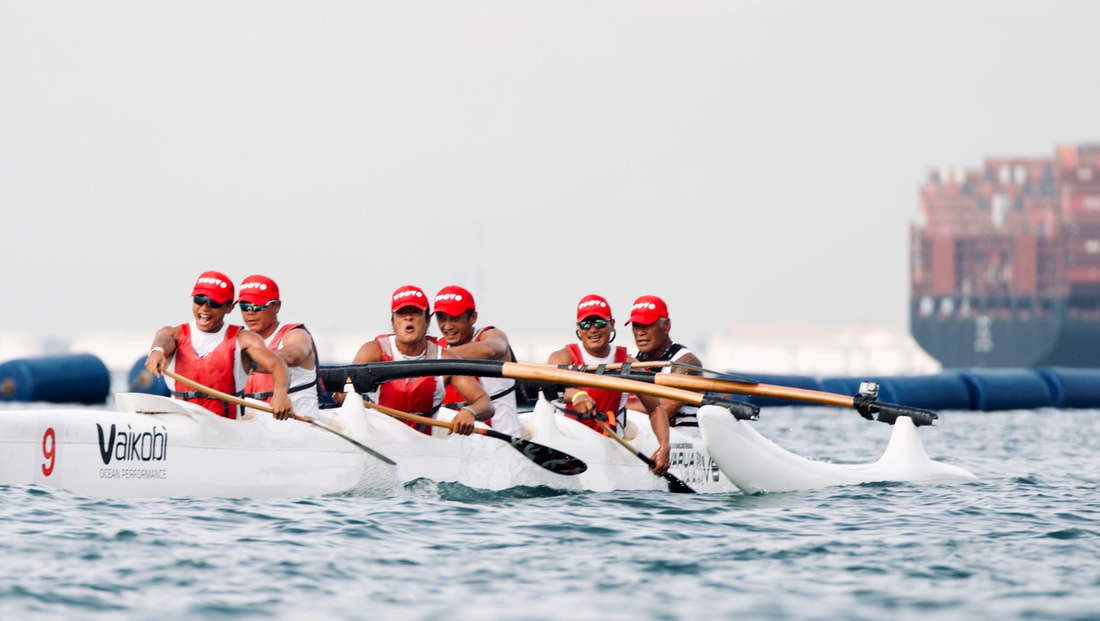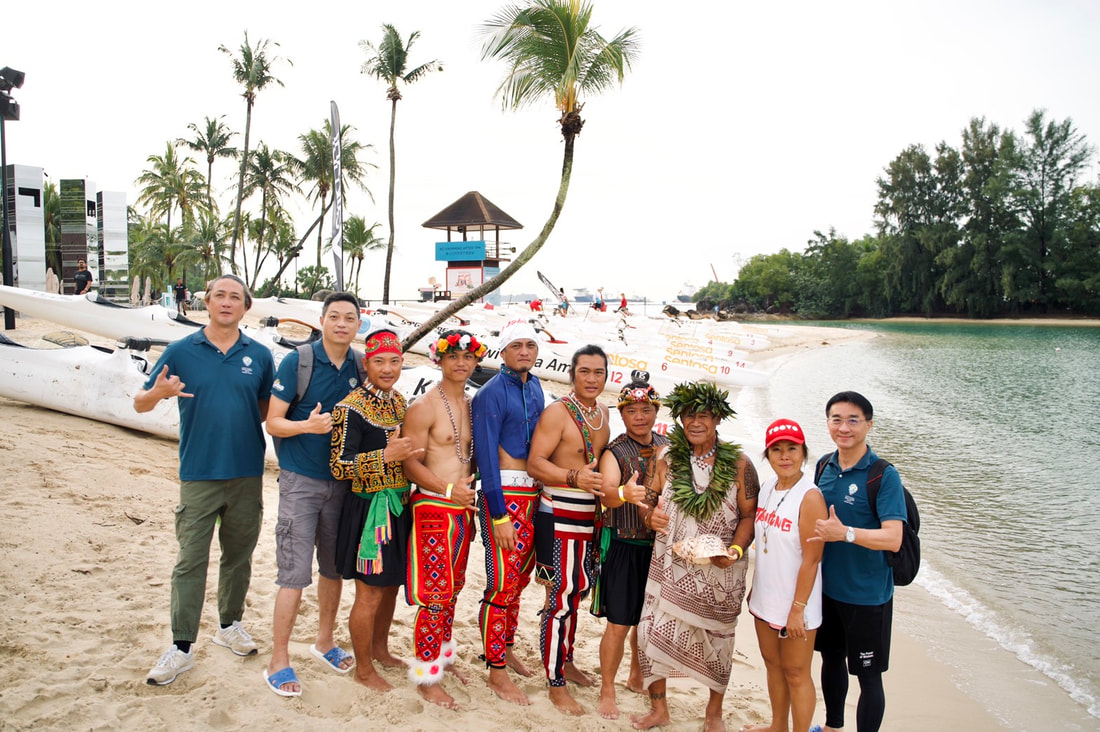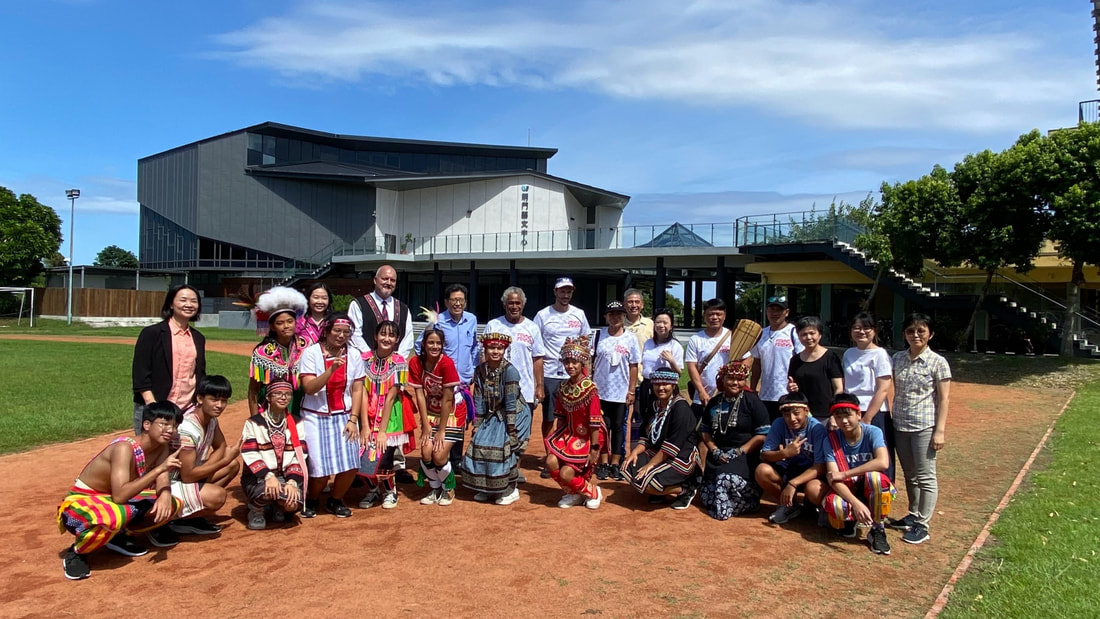Astronauts of the Sea:
Returning to the Roots of Maritime Culture
Four thousand years ago, the people inhabiting Taiwan were skilled in navigation. Their voyage had spread the Austronesian languages across islands of Southeast Asia and Oceania. The Austronesian languages thus then became the most used language from Hawaiʻi, Rapa Nui (Easter Island), Aotearoa (New Zealand) to Madagascar. “They were really the astronauts of our ancestors,” said Nainoa Thompson, Pwo Master Navigator and President of the Polynesian Voyaging Society. “They were the greatest explorers on the face of the earth.” The Austronesian language family were the astronauts of the sea.
Yvonne Chiang, Taiwan native was introduced to Hawaiʻian culture through outrigger canoeing
“Each person from one through six of the outrigger canoe has a specific role, and we call each other by our seat numbers. Seats 1 and 2 are at the forefront. Their roles are to monitor the ocean current, and to set the rhythm and rate. Seats 3, 4 and 5 are to keep an eye on the outrigger, as well as the ocean current on the left. They are the ‘motors’ of the canoe, the power seats. Seat 6 is the steersman and gives the instructions.” said Yvonne Chiang, founder of Taiwan Outrigger Canoe Voyaging Society (TOCVS). The deep rooted Austronesian culture as well as the unique bond and harmony within its teamwork is what attracted Chiang to outrigger canoeing, which derived from her avid passion for water sports. Each paddler plays a significant role which forms this family bond. Chiang who was residing in California at the time, frequently paddled between California and Hawaiʻi where she acquired her love for the sport.
Chiang, who trains four times a week and participates in 14 races a year, said, “When we learn outrigger canoeing, we inevitably learn the Hawaiʻian language and culture; for example, we say ‘huli’ instead of ‘capsizing’, or ‘lava’ instead of ‘stopping’. Without realizing, we are immersed into the culture.” Outrigger canoe and Hawaiʻi has strong history. What surprised Chiang initially was that most of the big outrigger canoe races are about “channel crossing” which is a reflection of the Austronesian migration and voyaging lifestyle. It shows that outrigger canoeing is not only a sport but a connection to Hawaiʻi’s Austronesian language family roots.
Hawaiʻians honour the fact that they are rooted in Hawaiʻi because their ancestors voyaged to Hawaiʻi by canoe. They believe the outrigger canoe is a direct connection to their ancestors which is why it is so greatly valued.
“Each person from one through six of the outrigger canoe has a specific role, and we call each other by our seat numbers. Seats 1 and 2 are at the forefront. Their roles are to monitor the ocean current, and to set the rhythm and rate. Seats 3, 4 and 5 are to keep an eye on the outrigger, as well as the ocean current on the left. They are the ‘motors’ of the canoe, the power seats. Seat 6 is the steersman and gives the instructions.” said Yvonne Chiang, founder of Taiwan Outrigger Canoe Voyaging Society (TOCVS). The deep rooted Austronesian culture as well as the unique bond and harmony within its teamwork is what attracted Chiang to outrigger canoeing, which derived from her avid passion for water sports. Each paddler plays a significant role which forms this family bond. Chiang who was residing in California at the time, frequently paddled between California and Hawaiʻi where she acquired her love for the sport.
Chiang, who trains four times a week and participates in 14 races a year, said, “When we learn outrigger canoeing, we inevitably learn the Hawaiʻian language and culture; for example, we say ‘huli’ instead of ‘capsizing’, or ‘lava’ instead of ‘stopping’. Without realizing, we are immersed into the culture.” Outrigger canoe and Hawaiʻi has strong history. What surprised Chiang initially was that most of the big outrigger canoe races are about “channel crossing” which is a reflection of the Austronesian migration and voyaging lifestyle. It shows that outrigger canoeing is not only a sport but a connection to Hawaiʻi’s Austronesian language family roots.
Hawaiʻians honour the fact that they are rooted in Hawaiʻi because their ancestors voyaged to Hawaiʻi by canoe. They believe the outrigger canoe is a direct connection to their ancestors which is why it is so greatly valued.
Taiwan, the origin of the Austronesian language family
In participating in different outrigger canoe races worldwide, Chiang met several people from the Austronesian language family who were her competitors. “When people learn that I am from Taiwan, they will say Taiwan is where their ancestors are from. At the time, my familiarity of what Taiwan means to the Austronesian language family was little to none; in fact, I assumed they meant Thailand.” said Chiang. Competitors from countries that speak Austronesian languages know of Taiwan as both the origin of the Austronesian language family as well as its maritime culture that spread across the Pacific and Indian Ocean.
The Austronesian language family explored the Pacific Ocean 500 years ahead of Ferdinand Magellan. They navigated through nearly one-third of the Earth’s surface discovering islands from Hawaiʻi, Rapa Nui (Easter Island), Aotearoa (New Zealand) to Madagascar. Their voyage required tremendous knowledge of the sun, moon and stars, the ocean and wind current, bird migration, and marine biology. They developed an expertise in astronavigation, a practice which New Zealand, Hawaiʻi and a few other countries that speak the Austronesian languages are now working to reclaim. Since 1976, the Hokuleʻa, a replica of an ancient voyaging canoe, has been sailing the world’s oceans using traditional astronavigation techniques without the use of electronic navigational instruments. It plans to explore all of the world’s oceans and will one day voyage to Taiwan.
In participating in different outrigger canoe races worldwide, Chiang met several people from the Austronesian language family who were her competitors. “When people learn that I am from Taiwan, they will say Taiwan is where their ancestors are from. At the time, my familiarity of what Taiwan means to the Austronesian language family was little to none; in fact, I assumed they meant Thailand.” said Chiang. Competitors from countries that speak Austronesian languages know of Taiwan as both the origin of the Austronesian language family as well as its maritime culture that spread across the Pacific and Indian Ocean.
The Austronesian language family explored the Pacific Ocean 500 years ahead of Ferdinand Magellan. They navigated through nearly one-third of the Earth’s surface discovering islands from Hawaiʻi, Rapa Nui (Easter Island), Aotearoa (New Zealand) to Madagascar. Their voyage required tremendous knowledge of the sun, moon and stars, the ocean and wind current, bird migration, and marine biology. They developed an expertise in astronavigation, a practice which New Zealand, Hawaiʻi and a few other countries that speak the Austronesian languages are now working to reclaim. Since 1976, the Hokuleʻa, a replica of an ancient voyaging canoe, has been sailing the world’s oceans using traditional astronavigation techniques without the use of electronic navigational instruments. It plans to explore all of the world’s oceans and will one day voyage to Taiwan.
Taiwan’s renewed identity
“In fact, the Austronesian language family all originated from Taiwan!” said Chiang. After understanding the connection between Taiwan and maritime culture, Chiang gains an even deeper sense of respect for Taiwan. “Since moving back to Taiwan and learning further its maritime culture, I decided to use the outrigger canoe as a tool to connect Taiwan Indigenous culture with the Austronesian language family around the world in hopes to create a new sense of identity for the Taiwan people.”
Though research on Taiwan’s association to the Austronesian language family can be found through anthropology and geography studies, Chiang hopes to spread it through sports. April 2022, Chiang established the TOCVS and attended the 2022 Taitung East Wave Festival in May. September 2022, TOCVS hosted the 2022 Taitung Blue Ocean Daily Festival which was approved by the Taitung government inviting Kimokeo Kapahulehua, founder of the Kimokeo Foundation.
“In fact, the Austronesian language family all originated from Taiwan!” said Chiang. After understanding the connection between Taiwan and maritime culture, Chiang gains an even deeper sense of respect for Taiwan. “Since moving back to Taiwan and learning further its maritime culture, I decided to use the outrigger canoe as a tool to connect Taiwan Indigenous culture with the Austronesian language family around the world in hopes to create a new sense of identity for the Taiwan people.”
Though research on Taiwan’s association to the Austronesian language family can be found through anthropology and geography studies, Chiang hopes to spread it through sports. April 2022, Chiang established the TOCVS and attended the 2022 Taitung East Wave Festival in May. September 2022, TOCVS hosted the 2022 Taitung Blue Ocean Daily Festival which was approved by the Taitung government inviting Kimokeo Kapahulehua, founder of the Kimokeo Foundation.
2022 Singapore Ocean Cup “Race Without Waste”
Kimokeo, also known as Uncle K, comes from a family of ocean explorers. In 1976, Uncle K’s uncle paddled from Hawaiʻi to Tahiti, and it was then that his uncle gave him the mission to explore all Hawaiʻian islands, a 1,600 mile journey, and to promote the Hawaiʻian maritime culture worldwide. Sharing the maritime culture with the world became his life’s mission. Now a cultural asset of Hawaiʻi, he is a master of his works and a respected cultural advisor. By uplifting Taiwan through its Indigenous culture and its link to the Austronesian language family in history, it could be a path towards a new identity for Taiwan.
In Hawaiʻi, it is common practice to have traditional protocols for ceremonies such as weddings, funerals, competitions, or the building of a new home by Hawaiʻian elders. Indigenous Hawaiʻians have special status in the community and rights to the land.
Kimokeo, also known as Uncle K, comes from a family of ocean explorers. In 1976, Uncle K’s uncle paddled from Hawaiʻi to Tahiti, and it was then that his uncle gave him the mission to explore all Hawaiʻian islands, a 1,600 mile journey, and to promote the Hawaiʻian maritime culture worldwide. Sharing the maritime culture with the world became his life’s mission. Now a cultural asset of Hawaiʻi, he is a master of his works and a respected cultural advisor. By uplifting Taiwan through its Indigenous culture and its link to the Austronesian language family in history, it could be a path towards a new identity for Taiwan.
In Hawaiʻi, it is common practice to have traditional protocols for ceremonies such as weddings, funerals, competitions, or the building of a new home by Hawaiʻian elders. Indigenous Hawaiʻians have special status in the community and rights to the land.
For the Singapore Ocean Cup “Race Without Waste” which took place between 3rd to 4th December 2022, Chiang put together the Taitung Austronesian team. Team members include artists, a teacher, veteran, and college student. Among the team, Akac Orat and Lafin Sawmah will partake in The Alliance Cultural Foundation’s (ACF) 4th Hawaiʻi Cultural Sustainability Educational Tour in 2023. Though the Taitung Austronesian team is not made up of professional paddlers, they all share the same passion for the ocean. Together they practiced for two months before heading to the competition in Singapore.
In the opening ceremony, the 2022 Singapore Ocean Cup was blessed by Uncle K, the Maui Indigenous people, and traditional song and dance by the Taitung Austronesian team. The Ti Leaf Leis used for the blessings were made by the five team members of Taitung Austronesian. Chiang said, “The blessings were conducted by Austronesian’s northernmost island, Hawaiʻi, southernmost island, New Zealand, and the origin of the Austronesian language family, Taiwan. It was like a diplomatic exchange of the Austronesian language family.”
The Taitung Austronesian team members were like the cultural representatives of Taiwan. The competition became a platform for them to share stories of their culture. Though it was their first time at the competition, they achieved two silver and one bronze medal.
In the opening ceremony, the 2022 Singapore Ocean Cup was blessed by Uncle K, the Maui Indigenous people, and traditional song and dance by the Taitung Austronesian team. The Ti Leaf Leis used for the blessings were made by the five team members of Taitung Austronesian. Chiang said, “The blessings were conducted by Austronesian’s northernmost island, Hawaiʻi, southernmost island, New Zealand, and the origin of the Austronesian language family, Taiwan. It was like a diplomatic exchange of the Austronesian language family.”
The Taitung Austronesian team members were like the cultural representatives of Taiwan. The competition became a platform for them to share stories of their culture. Though it was their first time at the competition, they achieved two silver and one bronze medal.
The ocean’s mark exists in our lives
For Orchid Island’s Tao people, paddling education starts from land. The children are first brought to the mountains to plant a tree. When the children grow older and the tree grows taller, they make a canoe out of the grown tree. The tradition of the Tao people is a sustainable cycle from land to sea. Taiwan, a land rich with Indigenous culture, should commit to the recovery of maritime culture.
Chiang envisions Taitung becoming a base for the recovery of maritime culture. She believes in Taiwan’s resources, for example, the Flowing Lake in Taitung which can be a safe training ground for paddling. If Taiwan created a maritime school, the maritime culture could be passed down generations long.
For Orchid Island’s Tao people, paddling education starts from land. The children are first brought to the mountains to plant a tree. When the children grow older and the tree grows taller, they make a canoe out of the grown tree. The tradition of the Tao people is a sustainable cycle from land to sea. Taiwan, a land rich with Indigenous culture, should commit to the recovery of maritime culture.
Chiang envisions Taitung becoming a base for the recovery of maritime culture. She believes in Taiwan’s resources, for example, the Flowing Lake in Taitung which can be a safe training ground for paddling. If Taiwan created a maritime school, the maritime culture could be passed down generations long.

